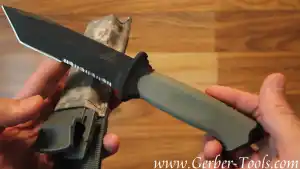All CS:GO Knives in Real Life
Hey kids, wanna go back in history?
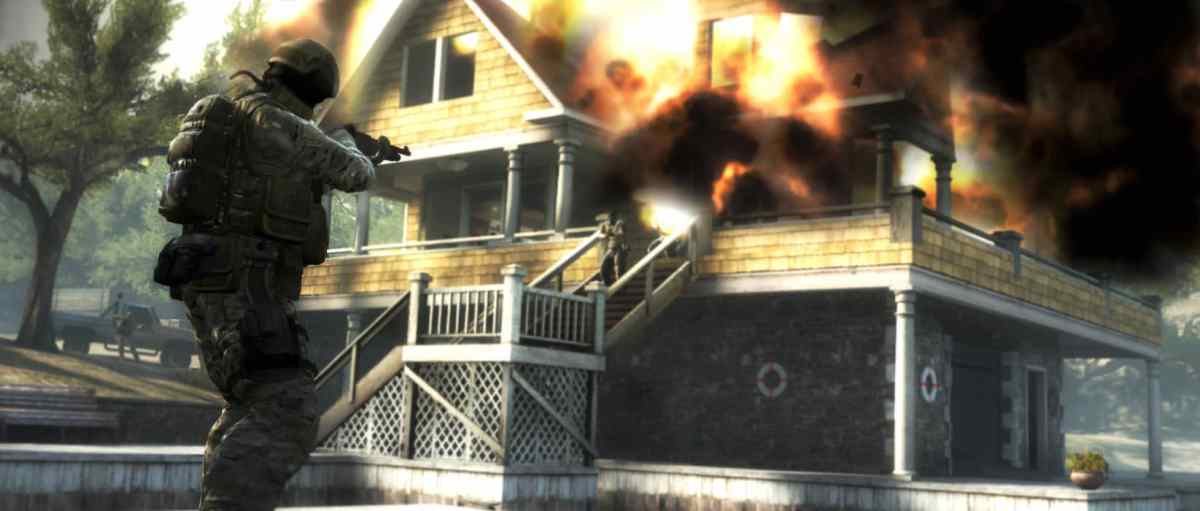
Knife skins in Counter-Strike: Global Offensive are usually the rarest and priciest ones and have never-ending popularity with players. This popularity has also transcended into real life as knife replicas based on CS:GO models and skin patterns have been constantly emerging, though many knives in Counter-Strike: Global Offensive existed already in real life. In this article here on Prima Games, we’ll go through their origins.
Every CS:GO Knife’s Counterpart IRL
We’ll go through all the types of knives available in CS:GO in alphabetical order, and we’ll update the list when Valve thinks of a new type of knife to introduce.
Related: Best Cases to Open in CS:GO (2022)
Bayonet / M9 Bayonet
The name “Bayonet” comes from a place called Bayonne in France. They were first made in the 17th century, and funnily enough, were originally used by putting the handle into the muzzle of your musket once you ran out of ammo and gunpowder (instead of it being under the barrel). The purpose was to replace the Pike spear.
Of course, once you inserted the Bayonet that way, you couldn’t fire the musket anymore. And a lot of the time, your Bayonet would get stuck in the barrel. This was fixed in the patch that came out by the end of the century. The last time Bayonets were widely used on rifles was in World War Two. And by that time, Bayonets evolved so that they could be detached and used like a hand-to-hand combat knife, survival knife, or tactical knife. Knives are still a part of a standard loadout of any soldier, but due to how the war has changed (and weapons evolved from muskets to rifles with big magazines), they are now mostly redundant as a weapon attachment.
Related: How to Most Efficiently Rank-up in CS:GO Competitive Matchmaking (2022)
M9 Bayonet (M9 Phrobis III) entered the US Army service back in 1987.
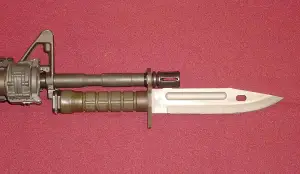
Source: Curiosandrelics / Wikimedia Commons
Related: The Best Smoke Spots on Inferno CS:GO Map
Bowie Knife
History around the Bowie Knife is kind of blurry and incomplete. One thing is certain, though: it originates from the Bowie brothers (James and Rezin) around the year 1830. No, these people are not related to the late David Bowie. It’s a big knife, designed to be a fighting knife, but it can also serve as a small Machete.
Its design in Counter-Strike: Global Offensive comes from AITOR Oso Negro knife in real life.
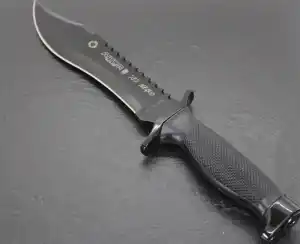
Butterfly Knife
This knife is known by other names in some parts of the world: Balisong, Batangas, fan knife, etc. It’s a simple, yet dangerous pocket knife that was invented in the Philippines and is banned in a lot of countries. Its handle consists of two parts, and the blade is hidden between them. By unlocking the two handle parts, you can spin them around and lock them back in, but this time with the blade being revealed and ready to stab and slice.
The popularity of the Butterfly knife is a normal thing, given that a lot of people use it to do spinning tricks with it on social media. With enough practice (with a dulled, training version), you can easily learn how to deploy this knife with one hand.
In CS:GO, you can do a trick with it by alternating between pressing the Inspect and Reload buttons on your keyboard.
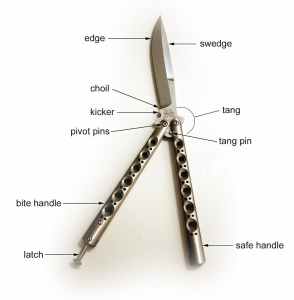
Falchion and Flip Knife
We are grouping these two due to the same way of deployment. The blade is also hidden within the handle like with the Butterfly Knife. It’s fixed by one end of the handle, and it’s free on the other end. When you are deploying it, the blade exits the handle with a 180-degree spin before fully deploying for usage.
Here’s the Flip (Benchmade 860 Bedlam):
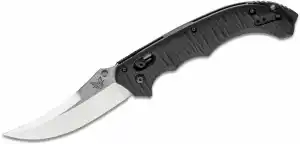
And the Falchion (Espada knife from Coldsteel):
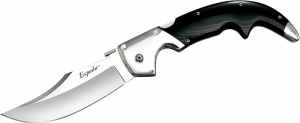
Related: How to Improve Trust Factor in CS:GO (2022)
Gut Knife
Given the name, it looks like it’s good for cleaning the guts of animals that you hunt in the wild. It’s also great to cut through ropes, webs, belts, and other similar fibers. It is based on a now discontinued knife called “Buck 193 Alpha Hunter.”
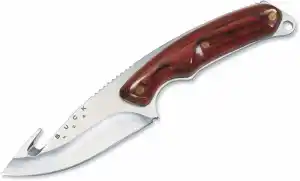
Huntsman Knife
This knife is based upon a real knife MTECH USA XTREME MX-8054 Tactical.
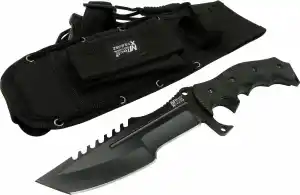
Karambit
Drum roll, please! Say hi to the most popular knife in CS:GO! Also known as Kerambit (in Indonesia), it originated in Southeast Asia and is used in various martial arts. Originally, it was intended to be used as a small sickle for agricultural purposes, and due to its claw-like shape and the ring at the end of the handle, it is perhaps the most characteristical knife in CS:GO. It’s fun to spin it using the ring, and there are of course two ways you can use it in real life: by putting your index finger in the ring, in which case the blade goes under your hand, or by putting your pinky finger in the ring if you wish your blade to be above your fist, as is the case with most “normal” knives.
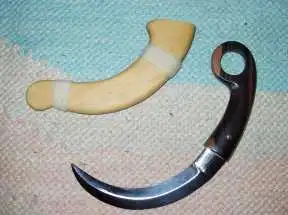
Source: Feyd Greenman / Wikimedia Commons
Can’t decide which knife you want to buy? See: CS:GO Knife Commands List: Use any Knife in CS:GO for Free.
Navaja Knife
This one comes from Spain and is traditionally a fighting and utility knife. It is one of the many folding knives in CS:GO and the name seems to have been derived from a shaving razor. It has been present in Spain for centuries, albeit less popular nowadays.
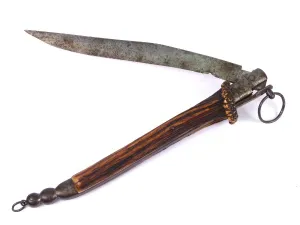
Source: Dana Williams / Wikimedia Commons
Nomad Knife
Nomad Knife is (yet another) flip knife made after a Strider B46 real-life knife. The fun part about this knife in Counter-Strike: Global Offensive is that the player model accidentally cuts itself every time the knife is drawn.

Paracord Knife
This one is very specific because it has a rope around the handle. It was added in the Shattered Web Case and looks like the Linton Cutlery knife. It’s a knife that has various uses in the outdoors.
Shadow Daggers
The most unorthodox “knife” on this list is actually a pair of small daggers that you technically use as brass knuckles. They are modeled after the Gerber Uppercut Double-Edge. They first appeared in the Shadow Case.
Skeleton Knife
One more knife that was introduced in the Shattered Web Case and is modeled after Renegade Tactical Steel Stryker throwing knives. And no, you cannot throw them in Counter-Strike: Global Offensive. They have a ring in the middle for stability and control of your thrust and/or slice. It’s possible to spin it around with the combination of Inspect and Reload buttons.
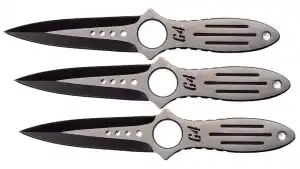
Stiletto Knife
This type of flip knife originates from Italy. It was added with the Horizon update in Counter-Strike: Global Offensive
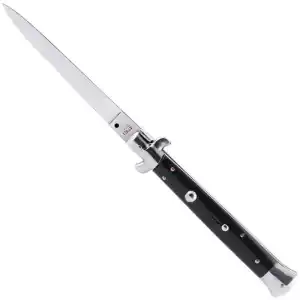
Survival Knife
This one looks like a Weyland Survival knife.
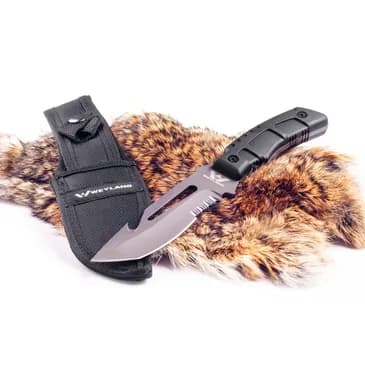
Talon Knife
Talon Knife is the long-lost brother of the Karambit knife. This one, however, looks like a KIASLORE Tiger Claw.
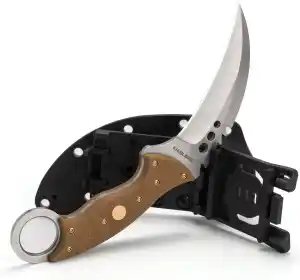
Ursus Knife
Ursus Knife is the CS:GO version of a real-life tanto style knife called Gerber Prodigy Tanto Knife 31-000558 which is now discontinued according to the Gerber website.
